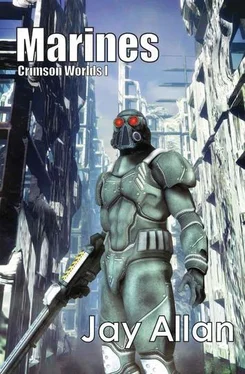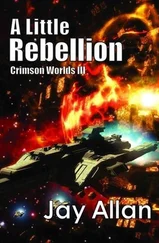I didn't have too many problems. As a child my family had a relatively low health care priority rating, but I'd still seen a doctor three or four times. Of course, once we left the Protected Zone there was no real access to medical care. I was generally very healthy, so I finished the battery of treatments in less than ten days, while some of my classmates were in the infirmary for three weeks or longer.
I'd broken my ankle while I was with the gang, and it never healed quite right, so they re-broke it surgically and fused it perfectly. Other than that, they addressed a few minor deficiencies caused by years of poor diet and malnutrition, and they corrected a few small genetic abnormalities.
The improvements were far more noticeable. The retinal enhancements not only increased my vision over long distances, but I found I could see in very dim light as well. My hearing was more acute, and I felt much more active and energetic. Certainly my reflexes were the best they'd ever been, and I could run faster and jump higher than before. A couple weeks later, when I cut myself during basic training exercises, I realized that I also healed faster. Actually, about twice as quickly as before.
Speaking of basic training, the general wasn't kidding when he said it would be the hardest physical exertion we'd ever experienced. It was about getting us into great shape, certainly, but it was also about testing us, pushing us to the limits of our endurance.
Camp Puller was just outside New Houston, not far from the edge of the quarantined zone around the ruins of the old city. For the record, southeastern Texas is hot as hell. And humid. And the worst of our training was thoughtfully scheduled during the height of summer.
A lot of people couldn't take it and washed out, even though the consequences of dismissal were grave for most of us. But the torment was more than just a weeding out process. The rest of us began developing a confidence we hadn't had before as we survived challenges we couldn't have imagined overcoming.
I almost lost my new found confidence when we started the classroom portion of training. Everyone needed some level of remedial work, but I hadn't seen a classroom since I was 8 years old, so I needed a lot. After the initial adjustment, I took to it pretty well, and by the time we wrapped up course work I had an education roughly equivalent to the one my father had, though mine was a bit more generalized.
I hadn't had time to think about anything while they were beating us into the ground in basic, but about halfway through the classroom training it started occurring to me that my life and attitudes had begun to change. I wasn't a gung ho marine yet by any stretch of the imagination. But up until that point I had been living day-to-day, and to the extent I thought about it, I figured I was there because I had no real choice.
Now I started to look ahead, to think about what it would be like to get to graduation and beyond. I knew I would be leaving Earth and everything familiar to me, possibly forever. That I would fight on strange worlds and quite possibly die on one of them. Yet I started to look to the future in a way I never had before.
My performance improved as time went by. I barely made it through the first year of course work without getting washed out, but by the end of the second I finished tenth in the class.
Then it was on to combat training. We learned hand-to-hand fighting and military history. But most of all we learned unit tactics. We started with lectures and demonstrations, but soon we were doing non-stop war games, tramping all over the hot, flat terrain killing each other in various simulated ways.
We took turns acting as squad leaders, but the higher positions were played by actual sergeants and officers. We were learning to be troopers, not commanders, and part of that meant experiencing what it would be like to fight under experienced leaders.
Once we'd mastered small unit tactics we started learning how to fight in armor. Our fighting suits are the most sophisticated and complex weapons ever constructed, and using one well - and not killing yourself with it - took extensive training. The armor is powered by a miniaturized nuclear reactor, which is built onto the back of the suit and looks a little bit like a large backpack. This is what really makes the armor such a powerful weapon. The energy created by the mobile plant is sufficient not only to operate the very heavy armor itself but also to power some very potent weapon systems. The Mark V powered infantry suit, the one in current usage, can accept four modular weapons systems, so a marine's arsenal can be tailored to the specific mission.
The primary infantry weapon for normal fighting is the GD-211 electromagnetic rifle, which fires a tiny projectile at extremely high velocity. Because of the high speed of the dart, the energy transference to the target is extreme, making it a very hard-hitting weapon with a very long effective range.
For fighting in vacuum or near-vacuum we have a variety of lasers and other energy weapons that are extremely effective in such conditions but subject to diffusion in higher atmospheric densities.
We also have grenade launchers, flame throwers, and a wide variety of highly specialized systems. Then, of course, we have the big boys - the nukes. Our armor can support several nuclear weapon delivery systems, delivering warheads of up to 20 kt.
Of course you can kill almost anyone just by punching them. The fighting suit vastly increases the strength of the user, allowing us to literally run through walls and jump 20 meters straight up. A skilled marine can deliver fire from mid-jump, reaching target locations that are blocked from the ground.
We were all anxious to start blasting the countryside with our new weapons, but the first month of training was spent learning how to walk. We'd had a few casualties during our war games and maneuvers, but these were mostly the results of scattered accidents. It was during suit training that the general's prediction that many of us wouldn't survive really came back to haunt us.
We lost 5 on the first day we actually wore the suits, mostly because they didn't listen to the instructors and tried to do too much, too fast. I started suit training with a healthy respect for the danger, and this only increased when I saw the bloody results of recruits who tried to run or jump without the right training.
Jumping wasn't difficult, but landing was another matter, at least landing safely. The suits provided a lot of protection, but you could still mess yourself up falling hard from 15 meters. It took a lot of practice to learn to land safely and even more to do it without losing a beat. After all, when we were in the show we'd be doing this under enemy fire. If you managed not to hurt yourself jumping, but you stumbled and faltered on the battlefield you could end up very dead, very quickly.
Once we were proficient with our suits we redid all the war games, fully armored this time. The final event was a full scale simulated assault against an entrenched defender. Half of us were attackers and half defenders. When we finished, we switched sides and did it all again. Projected casualties for the attacking forces were over 50%. I hoped we'd do better than that when we hit dirt somewhere for real. I knew from my studies that the average assault force in the Second Frontier War lost 18.2% killed and wounded, which was bad enough, but it was a hell of a lot better than 50%+.
At the end of our fourth year we left Camp Puller and boarded a transport for the orbital transfer facility. There we were loaded onto a ship called the Olympia and we headed out toward Sol Warp Gate #2, bound for Van Maanen's Star and the base located on the second planet of the system.
We were ready to start assault landing exercises and begin training for fighting in space. The Sol system was demilitarized by the Treaty of Paris, so all of our bases conducting anything but maintenance and refueling had to be located in other systems.
Читать дальше












